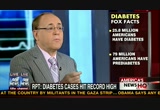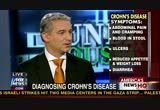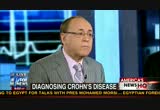tv Housecall FOX News November 18, 2012 7:30am-8:00am PST
7:30 am
know t look at the worldwide figures as of this year. an estimated 371 million people around the globe living with diabetes and they expect that to jump to 552 million over the next two decades. doctor segal, why is it going up, up, upnd a how do we stop it? united states is not off the hook. 26 million die bet identification inics in the you s6789 we've talked about it before. because of lifestyle, because 95% of diabetics have type 2 diabetes, a lot of insulin resistance. the pancreas makes insulin but it's not getting into the cells. you absorb sugar and need insulin to get it to your cells but something stops it. you're born with a number of
7:31 am
receptors but the more weight you gain, the less receptors you have available to you to get the sugar in. you have to do a simple thing. the tip is replace the bread you eat, the pasta, the sugar, you eat with fruit and vegetables, high in fiber and delay the amount of sugar that gets into your body. if you exercise and change your diet you cut down on the risk. >> is it too many shrugy drinks and desserts and snacking too much? >> that's a huge part. >> twinkies are gone. >> but you have a huge problem with sugar beverages. not just sodas, any sugary beverage. cakes, cookies, keam not keeping track. cutting down on portion size, all of this -- once you have diabetes, you can get rid of it by losing weight and exercise. >> doctor is a matty. people are switching to whole
7:32 am
wheat past and not just enriched whatever. >> iraq, the scope of -- eric, the scope of this disease is i don't think looking at a little bit of pasta or cheese. we're losing this battle. there's no doubt about it. look at the numbers here in the last decade, most of the country, about 50% increased their risk of diabetes. it comes in two styles. one is type 1, which means the pancreas doesn't make it. there's nothing you can do about it. type 2, which is what mark is talking about, is man made. we're the cause of it. it's a western country disease, too much food, portions are big. we're doing this. the way it works is obesity causes diabetes. fat is against insulin so the bigger we get, we call it insulin resistance. it doesn't work. the ohm way to take care of it is shrink and lose weight. by saying change your pasta is
7:33 am
not going to do it. how many people get seven hours of sleep in your cortisone is out of whack. how many people get up in the middle of the night, go to the refrigerator and do munching. this is not just about food, it's about discipline and lifestyle changes. you have to get rid of soda and -- >> alcohol? >> and nobody -- absolutely. nobody's going to do it except yourself. we have to wake up at a country. if you want to go for a second portion, back off. >> there's the prescription, eat less. >> see your physician. they monitor the hemoglobin to see if you're on the road to diabetes. we have to get 0 to those undiagnosed. >> hemoglobin a1c. >> eric writes all that down. his blood work must cost $1,000. >> new numbers of another
7:34 am
disease affecting millions. tuberculosis. a new study finds the number of cases dropped but the infectious disease is spreading. where? >> with this one we're doing actually much better. tuberculosis is the second cause of death among the infectious disease after h.i.v. in this country we're fine because we're getting tested, we get the skin test, we get injections. but a lot of other countries, uzbekistan, russia, this kind of tuberculosis especially epidemi. africa is high because h.i.v. infections are high and causes immune systems to be down. it caused by cough and droplets. london, england and the u.s. as a result of global travel we see it coming. the good news is the numbers are going down. the drug resistant tuberculosis
7:35 am
is high because either we're not treating them well or they're not getting appropriate medication. in this country, so far we're okay. >> i want to take a different perspective. in this country, we have about 10,000 cases which is down about 6%. the lowest recorded since the 1950's. because of the reasons david mention. we're isolating people that have them, make sure they're clear. we call it a red snapper. it's dramatic looking, acid fast stain. it looks like a hook. we're looking for it, treating it early and treating it at least six months. coming from other countries we have 40% of the tuberculosis in the world in india and china. if they don't get a full course of treatment or they're not isolated properly, you get that resistant tuberculosis. that's becoming epidemic. as the numbers go down, resistance go up. they come here and bring tuberculosis into the country. one of the most biggest problems
7:36 am
with tb is what's brought in from foreign countries. we have to get our information out there. we do a ppd, a purified protein derivative. >> we remember that as a kid. >> that's different. now we put auto tiny injection, we draw a circle and you come back in two days and see if it grows to 5 to 15 millimeters and we treat you before you get tb. >> should we get the test? >> of course. a lot of people that come from foreign countries, as a kid they may have had the vaccination and that may be positive for life, so you have to get a chest x-ray. in urologily occasionally we give hcg for bladder cancer and it may cause tests to be positive so you want to discuss this with your doctor that you
7:37 am
have gotten the treatment. >> something else to talk to your doctor about. i had no idea adult diabetes was within our control. i thought that it just escalates from something you're born with. we're going to watch our diet and exercise. lifestyle, folks. for women out there, how do you identify the signs of early menopause? maybe you weren't expecting it and all of a sudden it comes along. how do you cope with the symptoms? our doctors main what to look for. >> after five days, the battles between hamas and israel continue to escalate. coming up, a live report from the israel-gaza border and what's happening right now. [ female announcer ] today, jason is here
7:41 am
to volunteer to help those in need. when a twinge of back pain surprises him. morning starts in high spirits but there's a growing pain in his lower back. as lines grow longer, his pain continues to linger. but after a long day of helping others, pful advice. as lines grow longer, his pain continues to linger. just two aleve have the strength to keep back pain away all day. today, jason chose aleve. just two pills for all day pain relief. try aleve d for strong, all day long sinus and headache relief.
7:42 am
ettes a menopause begins at different times for different women and everyone's affected differently. knowing what to expect can make the transition easier. he want to ask what women should look out for. everybody gets menopause? >> everybody. >> everybody gets symptoms? >> not the same symptoms. some, the only change they have is a change in their period and losing their period. menopause is defined as not having a period for a year. you look at what your mother went through. when your mother started her period, when she finished, that's predictive of when it will happen to you. the symptoms your mom had, hot flashes are common during pen pause and -- menopause and that may be the first tip. the average age is 50 to 51. but you can start having symptoms years earlier. irritability, vaginal dryness.
7:43 am
hot flashes. we can treat these but they can be provoked by caffeine, alcohol, sleeplessness. so you want to take it easy and have a regular exercise routine and sleep right and be as calm as possible. of course we can treat hot flashes is other things. antidepressants. treat the vaginal dryness with estrogen creams. hormone replacement therapy i sometimes will prescribe. >> what are your recommendations and what are the risks of treatment? >> there's no general rule. if you talk to a lot of health experts they'll tell you you have to treat everyone individually. if the symptoms are mild you may follow them. but a lot of times if it's severe, night sweats, horrible hot flashing, you want to treat
7:44 am
them. estrogen protects against heart disease and stroke. that's a big ticket. against osteoporosis and bone loss. you want estrogen to prevent osteoporosis. the key is to take calcium, vitamin d, b6 and b-12, absolutely essential after you're diagnosed with menopause. one thing that came up is if i take soy and tofu because it has phytoestrogens can that help? most studies show estrogen in that is not enough to prevent menopause. if you like tofu, go do it. one of the herbal ones is cohoch, an herb that prevents hot flashes for six months. look into that. that's a a good one. a lot of studies about that.
7:45 am
>> your estrogen levels are going down. >> you can get those tested. >> absolutely. you can tell when you go into menopause by your estrogen level and follicle stimulating hormone. trying to make up for the loss of estrogen. >> eric doesn't need to write that down but don't men go through menopause? >> we have our moments. >> we'll talk about that during commercial. thank you, that's very helpful. >> crohn's disease affects hundreds of thousands of americans but it's hard to diagnose. what crohn's disease is and how to tell if you have it with the doctors. now go to foxnews.com/"sunday house call" to send questions on the topic and the doctors will break it all down coming up. look, if you have copd like me,
7:46 am
you know it can be hard to breathe, and how that feels. copd includes chronic bronchitis and emphysema. spiriva helps control my copd symptoms by keeping my airways open for 24 hours. plus, it reduces copd flare-ups. spiriva is the only once-daily inhaled copd maintenance treatment that does both. spiriva handihaler tiotropium bromide inhalation powder does not replace fast-acting inhalers for sudden symptoms. tell your doctor if you have kidney problems, glaucoma, trouble urinating, or an enlarged prostate. these may worsen with spiriva. discuss all medicines you take, even eye drops. stop taking spiriva and seek immediate medical help if your breathing suddenly worsens, your throat or tongue swells, you get hives, vision changes or eye pain, or problems passing urine. other side effects include dry mouth and constipation. nothing can reverse copd spiriva helps me breathe better. (blowing sou) ask your doctor about spiriva.
7:47 am
7:49 am
7:50 am
how does someone known it's crohn's and not ulcerate active co lights or inflammatory bowel syndrome. all the same? >> that's a great question. inflammatory bowel disease could be crohn's or ulcerate active co clear skies is inflammation of the colon. crohn's is usually progressive. it's chronic. we don't know what causes it. likely autoimmune disease can do this and these guys and girls are miserable because it goes on and on. i also learned there are different types of crohn's disease. it could be inflammatory but over time it can cause scarring and sclerosis and block the bowels. through cat scans and en enemasd
7:51 am
colonoscopy we can see the lesions and biopsy and there are antibodiesments patients like this go on for years not knowing what they have. the importance of this is that the sooner we know, the faster we can diagnose them because there's a risk of colon cancer. >> kids get it too. >> 15 to 35 is the age. >> wow. >> we happen to have a question on our online chat at fox news/house call. >> i've been back and forth to the gast intestinal doc for cramping. she's not labeling it crohn's but not taking it off the table. what if you have constant severe cramping and bloating. is that crohn's? >> it's not crohn's until we have the diagnostic studies, check antibodies because it's an
7:52 am
autoimmune disease. you might do a cat scan or mri or try to take a biopsy. with crohn's, you get the full level of the bowel from the outside to the inside all the way through. a full thickness. with crohn's, you have skip areas which aren't involved. regional interritis but your viewer is describing something. the idea of pain. pain and cramp something more consistent with inflammatory bowel disease than irritable bowel. if you have bloating and diarrhea, it might be irritable bowel. with pain, weight loss and bloody diarrhea, you worry. fevers, inflammation, you wonder could it be inflammatory bowel disease which affects half a million americans. the doctor can't just say this
7:53 am
could be. she has to do tests. >> what mark is trying to point point out, if it's acute, it could be viral or bacteria. if it goes on for weeks to months, you're talking about chronic disease which falls into the ibd. >> could it be hereditary? >> genetics, stress, environment. all of this. we don't know exactly but genes play a role. >> you have crohn's, 10% chance you have a relative with crohn's. >> thank you both so much. important topic for a lot of people. how many of you are worried you're losing your memory or you feel you're not as sharp as you used to be? we have brain boosting foods that could help. >> and fighting continues between israel and hamas where the rockets have been falling. s i have a cold, and i took nyquil,
7:54 am
but i'm still stubbed up. [ male announcer ] truth is, nyquil doesn't unstuff your nose. what? [ male announcer ] alka-seltzer plus liquid gels speeds relief to your worst cold symptoms plus has a decongestant for your stuffy nose. thanks. that's the cold truth! can i still ship a gift in time r christmas? yeah, sure you can. great. where's your gift? uh... whew. [ male announcer ] break from the holiday stress. ship fedex express by december 22nd for christmas delivery.
7:57 am
7:58 am
you want to get it from nuts as a snack food. you want to get it from fish. you want the fish omega 3 fatty aside and it is other thing is what you don't eat. cut out alcohol. some studies show small amounts of alcohol may improve brain function, but a moderate drinker will exok off neurons and have more special more problems. the other thing is coffee. dr. samadi has introduced coffee and the studies are dramatic that coffee improves brain function and decreases risk of depression, up to 6 cups a day, decreases risk of depression by 20%. >> eric: six cups? >> one to six cups decreases risk of stroke by 17%. we have been over how many cups are ideal. i don't want to get back into that. coffee-- the more you drink, up to a certain point eye have issues with coffee with the stomach, but up to a certain
7:59 am
point tdramatically increases mood and decreases risk of depression and stroke. >> four cups of coffee is good. he did the whole dance around the reflux. so coffee is good. anything hais good for your heart is good for your brain. those antioxidants, my favorite is the salmon because of the omega 3 fatty acids. i love avocado, nuts, offcodo with your salad, you get the fiber. all of this stuff -- wine, you know, there are a lot of studies issue but a little wine is okay tdoesn't turn the neurons into morons. chocolate and those buries. i know -- berries -- >> berries and chocolate. >> samop, nuts, wipe and berries. >> jamie: great, great show. get to texting and talking. the doctors will continue the
88 Views
Uploaded by TV Archive on

 Live Music Archive
Live Music Archive Librivox Free Audio
Librivox Free Audio Metropolitan Museum
Metropolitan Museum Cleveland Museum of Art
Cleveland Museum of Art Internet Arcade
Internet Arcade Console Living Room
Console Living Room Books to Borrow
Books to Borrow Open Library
Open Library TV News
TV News Understanding 9/11
Understanding 9/11































